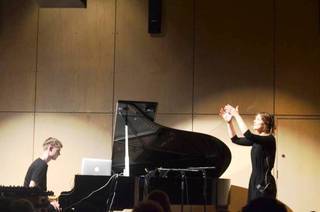|
Back
Poetry Becomes Body New York
Austrian Cultural Forum
05/30/2018 -
Lauren Kinsella, Elias Stemeseder: Press Play Backwards
Lauren Kinsella (Performer), Elias Stemeseder (Pianist), K.J. Holmes (Stage Movement)

E. Stemeseder, L. Kinsella (© Austrian Cultural Forum New York)
“Oh day of rath! Ah, murther of mines! Eh, selo moy!
Uh, zulu luy! Bernesson Mac Mahahon from Osro bearing nose
easger for sweeth prolettas on his swooth prowl!”
James Joyce, from Finnegans Wake
“As the wind loves to call things to dance,
May your gravity be lightened by grace.”
John O’Donohue (1954-2002): On Loneliness
In the words of an equally eminent Irishman, Dr. Swift, may I offer a “modest proposal” for the magical Lauren Kinsella? That she take any 20 or 30 or 40 pages from Finnegans Wake–not the thundering beginning or river-tumbling end–from the middle of the volume?
(Or in Joyce’s words, Ms. Kinsella can go “hopping round the middle like kippers on a griddle”)
Then she could could simply read them. But without a break or music or special lighting, Ms. Kinsella can offer these Three Stooges-Hegelian-pun-stricken pages as a gift to an audience, donating her body, her dancing, that voice, with the keening and scat-singing and the lyrical Bellini arias which Joyce loved so much.
I am not trying to belittle her stunning “opera” (her words, not mine) of last night’s premiere of Press Play Backwards. She was mesmeric, the staging was hypnotic, the poetry was music, the music was (with a few exceptions) a poetic complement.
At the same time, Ms. Kinsella and pianist Elias Stemeseder lost some great opportunities, the cleverness and verbal deconstructions hiding and disguising the poetry of John O’Donohue.
The Irish priest, bard, Hegelian philosopher whose words made up the bulk of the one-hour work, was unknown to me. But a brief look at his work, and a lengthy read of his poems, made me realize that Father O’Connor could join that splendid Celtic exuberance of Joyce, Flann O’Brien, Yeats and Beckett, save that Father O’Donohue had an ethereal clarity, his words speaking for themselves.
So why, I asked myself, did Ms. Kinsella have to break up those words with breaths and sotto voce whispering, with screams up two octaves, with movements ranging from the teasing (bare feet poking over the balcony) to the lubricious to intimidating stares at the audience?
With Samuel Beckett–as Luciano Berio showed last week in his Sinfonia–the words can be repeated and obliterated and hidden, and the power with the music continues. With the words of John O’Donohue, and presumably others, we had a sensational one-woman show which showed...well, the genius of one woman.
But was I transformed in the words the way Berio transformed me? Not a chance. Not presuming to know what the Austrian Cultural Forum audience knew, I have the feeling they were applauding Ms. Kinsella, yet wouldn’t have had the slightest idea what she was doing.
She wasn’t at all alone. Her collaborator, Austrian-born classically-trained Brooklyn-residing jazz pianist Elia Stemeseder provided a conglomeration of music, almost always with a jazz syncopation. With serious mien, he plucked in and out of the piano, he fiddled with white/black sound electronic buttons and seemed to improvise with Ms. Kinsella.
That wasn’t actually true. At times, the music and voice coincided. The two actually had a duet of sorts, as Ms. Kinsella provided words repeated with further words repeated, all à la the last-movement intro of Beethoven’s First Symphony.
Mainly, however, Mr. Stemeseder was the accompanist, varying from cocktail-tumblings to Tatum-riffs to jazzy ostinati. He is an accomplished musician to be sure, yet I never felt that he and Ms. Kinsella were on the same emotional page.
After awhile, though, I stopped listening to him. And sadly, I stopped trying to find a foundation or even a raison for the programmed “ancient Greek concept of time:Chronos/Kairos.”
That may indeed have been the basis for this theater-piece. It was unhappily lost in the endless creations and incarnations of Ms. Kinsella herself.
Harry Rolnick
|